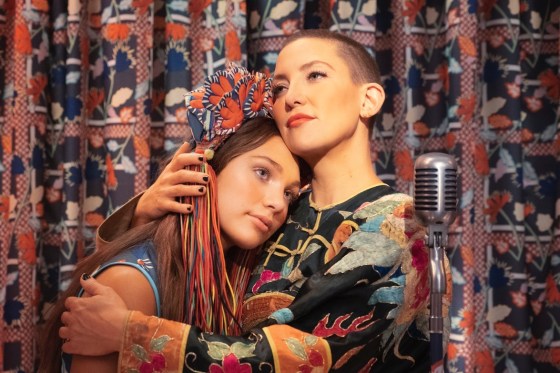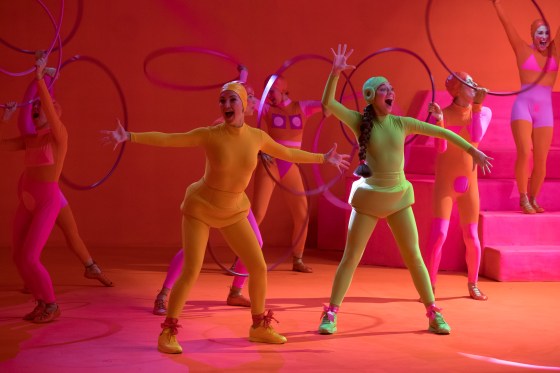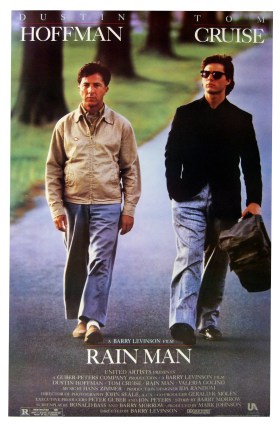When I watched the teaser trailer for Music back in November, my first impression was one of distaste. In tone and intent, I found Sia’s sensory-overloading musical film about a non-speaking autistic girl—which is up for two Golden Globes this weekend—eerily reminiscent of “The Bob Lamonta Story,” a 1997 Mr. Show with Bob and David skit that skewered abled actors playing disabled characters in pandering, stereotypical dreck and then rewarding themselves for their brave choices. As someone who cares about film as an art form—and as someone who has covered and reviewed it for over 20 years—I thought it looked like a bad movie.
My opinion began to evolve from merely bad to both bad and harmful as I learned more about the film’s genesis and production. I felt uneasy about Sia’s desire to make what she called “a love letter to caregivers and to the autism community,” without more meaningfully involving anyone from that community in her process. The singer’s callous responses to autistic people’s concerns on Twitter did nothing to increase my trust in her ability to treat us like full-fledged human beings onscreen. I was disappointed that she hadn’t tried harder to look for and accommodate a non-speaking autistic person in the title role before casting her frequent collaborator Maddie Ziegler, a non-autistic person. I was upset by a profile on Ziegler that mentioned her research for the role included watching meltdown videos on YouTube, especially because neither the actor nor her interviewer seemed to demonstrate any uneasiness about the practice of parents filming their autistic children’s most vulnerable moments and posting them online. (Like many autistic people who have issues with Music, I have little interest in blaming Ziegler, who was 14 when she started working on the project, and appears to have expressed some concerns about it during filming, which Sia shot down.)

I was genuinely horrified by the scenes in which Music, the character, was subjected to prone restraint, a technique to subdue autistic people which has caused multiple deaths. (Sia later apologized and promised to add a warning or remove the scenes; the version I rented featured neither change.) As an autistic person who cares very deeply about autistic rights and representation, I believed that Music, which was released in Australia in January and in the U.S. earlier this month, had the potential to be patronizing, exploitive and genuinely harmful.
And still, on top of all that: I thought it looked like a bad movie.
The reactions that I saw from many of my fellow autistic people on social media—one of the few places autistic voices are able to gain any traction—were also multifaceted. Plenty of people were rightfully angry, but they were also heartbroken, exhausted, annoyed and aesthetically disappointed, offering nuanced critiques of autism and disability in the media. So I was frustrated to see the entire spectrum of less than positive responses to the movie reduced to “Twitter mob” outrage in news stories and condemned as a threat to creativity by Sia fans and columnists.
The difference between criticizing art that is bad for representation and criticizing art that is bad on aesthetic grounds isn’t always clear cut—and the two frequently overlap. My efforts in the latter are often influenced by the former. I tend to find that, perhaps unsurprisingly, art made by creators who treat humans who aren’t like them as props or creative exercises tends to be quite hollow. Creators who fail to research, understand or empathize with the communities they’re taking it upon themselves to represent—or write a “love letter” to, as Sia called it—often make bad art. Even if you could separate the two, I don’t believe that aesthetic criticisms should necessarily take precedence over representational ones. It’s certainly more important to highlight that many autistic people find Music harmful and hurtful than it is to mention that there are many who think it sucks.
But reducing the entirety of the autistic response to Music to simple offense or outrage does as much of a disservice to autistic people as the film does. Art and creative expression are parts of the human experience, and autistic people are human. Autistic people also consume art and form opinions on it. Some of us even make it. What’s being treated as autistic people attempting to dictate the terms by which anyone can tell a story about autism is actually more a desperate attempt to get to participate in the conversation at all.

These arguments about who gets to tell what stories and who gets to criticize them are especially frustrating because they’re almost entirely ignorant of the conversations on the topic that autistic people—and disabled people in general—are already having. When Sia’s supporters point to previous instances in which abled actors played disabled people, like Dustin Hoffman in Rain Man, Kevin McHale in Glee, Freddie Highmore in The Good Doctor or Daniel Day-Lewis in My Left Foot, and suggest that those film’s creators didn’t receive nearly as much criticism as she has for Music, what that tells me is that they weren’t listening to the people who were making those criticisms. Disabled people have been making thoughtful and nuanced criticisms of these and similar casting choices for as long as they’ve been happening. The same goes for the narratives these performances facilitate. Unfortunately, until recently, platforms to discuss disabled stories have been as inaccessible to disabled people as the resources to tell those stories in the first place. Social media has helped to boost voices and perspectives that have long been ignored, but we still have a long way to go.

Disabled stories that abled people make for abled audiences are often offensive, but they’re also often predictable and boring. Abled actors’ performances, including Ziegler’s, tend to focus on portraying the appearance of disability more than the person. Which abled audiences, who generally view disability from the outside when they think of it at all, often praise as authentic. From Rain Man to Me Before You to Music, there’s a long tradition of disabled characters being treated as objects in abled people’s stories, and stepping stones to their growth. Even in critically acclaimed fare like Million Dollar Baby, these stories wind up saying more about abled people’s fear of disability and becoming disabled than they do about disabled people’s realities. Very little of this resembles the lives that disabled people actually live, or the stories we tell. There’s the occasional hint of something better or more human in some of these stories, and some disabled people I know can cite a character or story that did speak to them on some level. (For example, I think Danny Pudi’s portrayal of the autistic-coded Abed on Community did a great job of fusing mannerisms and behaviors with personhood.) But the decent stories and performances are the exception, not the rule. And they’re no substitute for better opportunities for disabled artists.
Debates about casting often come down, on one side, to creative freedom. “There’s a real narcissism at the heart of this push to police who can and can’t play certain roles. While it’s laudable to give marginalized groups a fairer crack at the whip when it comes to exposure and job opportunities, the obsession with being ‘represented’ denies the whole escapism of fiction,” The Telegraph’s Ella Whelan wrote in defense of Sia last November. But what about the selfishness of artists who want to tell disabled stories and audiences who want to enjoy them without ever once having to consider their real-life counterparts? I’m not going to cry too hard for the creative freedom of abled artists when they still have access to far more resources and support for disability narratives than disabled artists do. Nor do I have much respect for the kind of creativity that can only imagine disabled people as tools of one’s own expression, not as collaborators, cast members, or even a valued part of the audience.
I’m not particularly sympathetic to an abled viewer’s desire for escapism when disabled ones are constantly confronted by how little creators and fans must think of us. And I don’t have much faith in the opinions of critics or fans who haven’t done any significant reflection on what makes them like the disability stories they consume, whether disabled people feel different about those same stories, and why that might be. (Even Roger Ebert, whose thoughtfulness and empathy I’ve admired since I first started reading film criticism, came out of Rain Man wondering “Is it possible to have a relationship with an autistic person? Is it possible to have a relationship with a cat?” and essentially praising the lack of personhood apparent in Hoffman’s “uninflected, unmoved, uncomprehending” Raymond.)
In the interest of fairness, I did watch Music for the sake of this piece. I won’t evaluate it as representation, as I believe that non-speaking autistic people should be leading that conversation. (For more on the topic, I recommend starting with the short film produced by CommunicationFIRST and the essays by Mickayla and Hari Srinivasan.) In my capacity as a culture writer, though, it was almost exactly what I expected it to be. Music only challenged my expectations in the sense that its title character isn’t the only one treated like a prop in the story. All of the other characters and their lives, including, bizarrely, Sia playing herself, are also empty vessels for plot development and cheap emotional manipulation. The story they embody is a cloying, haphazard, and exposition-heavy mess. Even in a lean year for film, its Golden Globes nominations for Best Picture – Musical/Comedy and Best Actress – Motion Picture – Musical/Comedy for Kate Hudson as Music’s sister, Zu, are truly perplexing.
A Sia supporter might claim that I already had my mind made up about the movie, and reviewed it through my preexisting bias. But I’d argue that as someone who pays attention to both film and disability issues, I simply recognized the long-term problems inherent in the trailer, made an educated guess about what the full film would be like, and was saddened to have my suspicions confirmed. I’m not outraged at Music because it doesn’t check the specific boxes I require for good representation—I actually doubt casting an autistic actor would have improved matters much. Rather, I’m disappointed that it is yet another failure to reflect more of the human experience. I have no desire to restrict the creativity of abled artists who want to tell empathetic, respectful, and aesthetically sound stories about disabled people. I’m desperate to finally see some proof that they can.
Sarah Kurchak is the author of the memoir I Overcame My Autism And All I Got Was This Lousy Anxiety Disorder (Douglas & McIntyre).








0 comentários:
Post a Comment